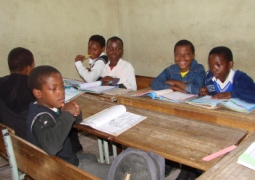
The Chairperson of Parliament’s Portfolio Committee on Basic Education, Ms Nomalungelo Gina, believes the education budget for the 2018/19 financial year, despite a slight decrease, will help address the quality gap between education in urban and rural areas.
During a debate of the budget vote of the Department of Basic Education, in a mini-plenary of the National Assembly, Ms Gina said the Portfolio committee was convinced that the budget will make a difference.
She said the committee was assured that the budget will be prioritised to interventions and programmes aimed at improving quality and accountability in the education system.
Ms Gina highlighted that the ruling party, the National African Congress, has directed government to deal decisively with challenges of inequity between rural and urban education by ensuring that there is adequate resourcing of village and township schools through the provision of quality, efficient, innovative and inclusive education and training programmes and solutions.
“A rural learner deserves quality teachers of similar weight as in urban areas and we believe the R29.1 million allocated for rural education unit will assist in bridging the gap,” she said.
She added that incentives through which teachers can be attracted and retained in rural and farm communities must be explored and sustainably implemented and monitored.
“We believe it will be used to improve basic literacy and numeracy, roll out the reading to learn campaign, budget geared towards addressing the triple challenge of poverty, inequality and unemployment, a budget that will continue to feed 9.7 million learners.
She also commended the plans to by the Department of Basic Education to accelerate the implementation of African languages to all schools as part of social cohesion.
In order to speed up the debates of the budget votes of all government departments and those of the Presidency and Parliament, the National Assembly has established mini-plenaries, in terms of the new rules of the National Assembly.
Mini-plenaries, are not Committees of the National Assembly, as was the case with Extended Public Committees, but are mini-sittings of the House, their function includes debates on other matters other than budget votes and their business may proceed irrespective of the number of Members present as no decisions are taken in a mini-plenary session.
Items that may be dealt with in mini-plenary sessions include debates on committee reports, first reading debates on bills, members’ motions not requiring decisions, among others.
When tabling the budget vote for debate, Minister Angie Motshekga assured Members of Parliament that her department will give more attention to quality, inclusive education and rural education was part of this focus area.
Minister Motshekga announced that the overall 2018/19 Medium Term Expenditure Framework (MTEF) budget allocation for the Department of Basic Education was just under R23 billion, which she said as a result of the austerity measures, was decreased by 3% from the 2017/18 allocation.
The Minister said the budget cuts, exacerbated by the fact that provincial education departments have since stopped to allocate funds for infrastructure delivery, will make it difficult to conform to the norms and standards for school infrastructure.
“The current pressures on appropriate sanitation provisioning in our schools will require innovative funding strategies, including generous contributions from the private sector and South Africans,” she said.
She said the need for quality education was in line with the Sustainable Development Goals (SDGs) that make up the Agenda 2030 for sustainable development.
“SDG 4 in particular, calls for an inclusive, quality and equitable education and life-long opportunities for all. The Constitution, the National Development Plan, as well as the continental and international conventions, provide the moral imperative and a mandate to the government to make access, redress, equity, efficiency, inclusivity and quality educational opportunities widely available to all citizens,” the minister said.
We are doing everything we can to ensure that we continue the trajectory of educational improvement we have seen over most of the past 15 or so years.
The Minister also lamented the death of two grade R children in separate incidents after they drowned in pit latrines in their schools in Limpopo and Eastern Cape, and said the department was doing everything possible to improve the quality of school infrastructure, especially sanitation, to prevent further ensure safety of children.
“The fact that we had to face two fatalities, related to two Grade R children drowning in pit latrines is lamentable, and could have been prevented. We are mobilising all available resources, including the participation of the of the private sector and other professionals to heed the President’s call for a thorough audit of inappropriate sanitation facilities and the development of a costed plan,” she said.
Concerns about poor sanitation in schools was also raised by Members of the National Assembly from the opposition parties.
The Democratic Alliance’s Ms Nomsa Tarabella-Marchesi said the fact that 24 years into our democracy, the country was still grappling with pit toilets in schools “is not only embarrassing, it is also shocking”.
“As I stand here one would ask what do learners, parents and South Africans expect from this Basic Education budget vote – firstly their expectation will be sanitation, a priority needed to be addressed and to fulfil the promises made in 2014 to eradicate pit toilets after the death of Michael Komape who fell into a pit toilet in Limpopo and Lumka Mthethwa who also fell into a pit toilet that was to be decommissioned in the Eastern Cape,” said Mr Tarabella-Marchesi
She also said the budget falls short of expectations, “we seem to be making it harder and harder for South African children to get proper education and improve their future”.
By Sakhile Mokoena
10 May 2018

